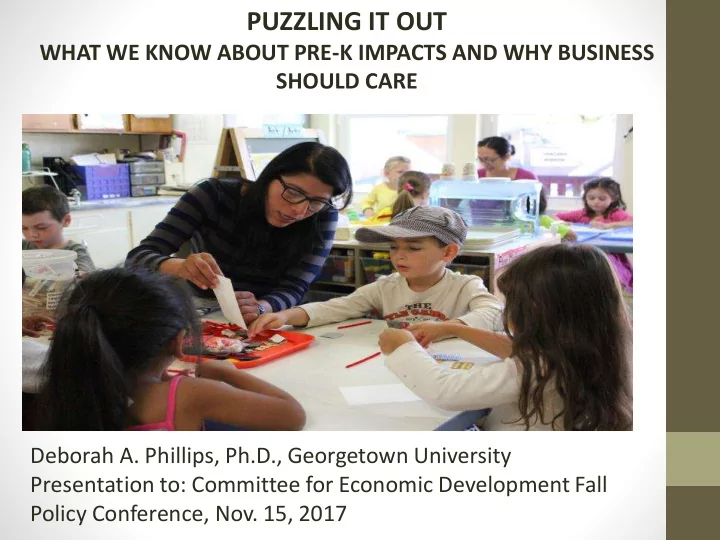

PUZZLING IT OUT WHAT WE KNOW ABOUT PRE-K IMPACTS AND WHY BUSINESS SHOULD CARE Deborah A. Phillips, Ph.D., Georgetown University Presentation to: Committee for Economic Development Fall Policy Conference, Nov. 15, 2017
Authors & Funders • Deborah Phillips, Georgetown University • Mark Lipsey, Vanderbilt University • Ron Haskins, Brookings Institutions • Kenneth Dodge, Duke University • Daphna Bassok, University of Virginia • Margaret Burchinal, University of North Carolina • Greg Duncan, University of California-Irvine • Mark Dynarski, Brookings Institution • Katherine Magnuson, University of Wisconsin • Christina Weiland, University of Michigan Heising-Simons Foundation David and Lucile Packard Foundation
Why Important? 2Gen Perspective • Brain Development • First step of workforce development • Return on Investment • Essential job support • ECE depends on a workforce
CED’s Longstanding Leadership
Puzzling It Out Beyond one study at a time Beyond one outcome at a time Beyond one year in a child’s life What do children bring to pre-k? What do they experience in pre-k? What happens next in elementary school?
Learning is Continuous and Cumulative “Children’s early learning trajectories depend on the quality of their learning experiences not only before and during their pre-k year, but also following the pre-k year. Classroom experiences early in elementary school can serve as charging stations for sustaining and amplifying pre-k learning gains. One good bet for powering up later learning is elementary school classrooms that provide individualization and differential in instructional content and strategies.”
Pre-K and School Readiness “Convincing evidence shows that children attending a diverse array of state and school district pre-K programs are more ready for school at the end of their pre-K year than children who do not attend pre-K. Improvements in academic areas such as literacy and numeracy are most common. The smaller number of studies of social-emotional and self-regulatory development generally show more modest improvements in those areas.”
Some Children Benefit More “Studies of different groups of preschoolers often find greater improvement in learning at the end of the pre-k year for economically disadvantaged children and dual language learners than for more advantaged and English- proficient children.”
Effectiveness Factors “Pre -k programs are not all equally effective. Several effectiveness factors may be at work in the most successful programs. One such factor supporting early learning is a well implemented, evidence-based curriculum. Coaching for teachers, as well as efforts o promote orderly but active classrooms , may also be helpful.”
Enduring Impacts? The Next Frontier “Convincing evidence on the longer -term impacts of scaled-up pre-K programs on academic outcomes and school progress is sparse, precluding broad conclusions . The evidence that does exist often shows that pre- K induced improvements in learning are detectable during elementary school, but studies also reveal null or negative impacts for some programs.”
Partnerships for Continued Improvement “States have displayed considerable ingenuity in designing and implementing their pre-k programs. Ongoing innovation and evaluation are needed during and after pre-k to ensure continued improvement in creating and sustaining children’s learning gains. Research-practice partnerships are a promising way to achieving this goal. These kinds of efforts are needed to generate more complete and reliable evidence on effectiveness factors in pre-k and elementary school that generate long- run impacts.”
Final Thoughts • “ We have a national platform on which to build next stage, increasingly effective, and longer lasting pre-k programs. The hard work of refining and improving these programs so that they can fully support the intellectual and social skills the nation will need in the future has just begun."
Final Thoughts • “Nonetheless, the scientific rationale, the uniformly positive evidence of impact on kindergarten readiness , and the nascent body of ongoing inquiry about long-term impacts lead us to conclude that continued implementation of scaled-up pre-k programs is in order as long as the implementation is accompanied by rigorous evaluation of impact .”
Thank you! Deborah A. Phillips Dap4@georgetown.edu
Recommend
More recommend